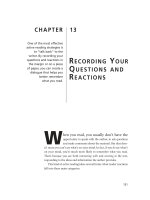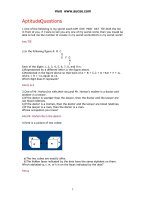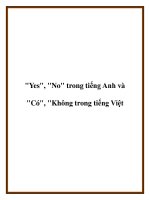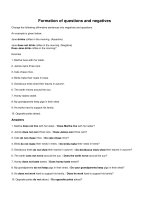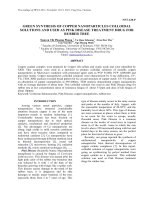Yes no questions and use
Bạn đang xem bản rút gọn của tài liệu. Xem và tải ngay bản đầy đủ của tài liệu tại đây (8.81 KB, 2 trang )
Yes / No questions
Yes / No questions
are those questions that expect ‘yes’ or ‘no’ as answer. These questions do not take the
question words when, what, where etc.
Yes / No questions are used to check information or ask for confirmation.
‘Are you coming with us?’ ‘Yes.’
‘Has he returned the car?’ ‘No, he hasn’t.’
‘Do you live in Chicago?’ ‘No, I don’t.’
‘Does she speak English?’ ‘Yes, she does.’
‘Did you meet John yesterday?’ ‘No, I didn’t.’
Note the use of auxiliary verbs in the above examples.
When we answer
Yes / No questions
we do not normally repeat the complete the question. Instead, we use an
appropriate auxiliary verb. This auxiliary is usually present in the question.
‘Does Mike live with you?’ ‘Yes, he does.’
‘Did Maya tell you she wasn’t coming?’ ‘No, she didn’t.’
In negative answers we use the auxiliary verb and
not
. Usually a contracted form is used.
‘Have you ever visited Argentina?’ ‘Yes, I have.’
‘Will you help me?’ ‘No, I won’t.’ (won’t = will not)
Here is an overview of Yes / No questions in different tenses.
Present Simple
‘Do you speak English?’ ‘Yes, I do.’
‘Does she speak English?’ ‘No, she doesn’t.’
Present continuous
‘Are you coming with us?’ ‘Yes, I am.’
‘Is it raining?’ ‘Yes, it is.’
‘Is it snowing?’ ‘No, it isn’t.’
Present Perfect
‘Have you received the letter?’ ‘Yes, I have.’
‘Has he returned from Mumbai?’ ‘No, he hasn’t.’
Past Simple
‘Did you know the answer?’ ‘No, I didn’t.’
‘Did he get the letter?’ ‘Yes, he did.’
Past Continuous
‘Were you sleeping then?’ ‘Yes, I was.’
‘Was he reading his lessons?’ ‘No, he wasn’t.’
Future Simple
‘Will you come with me?’ ‘Yes, I will.’
‘Will you help me?’ ‘No, I won’t.’
Be first to know when grammar rules change! Sign up to our newsletter here: englishgrammar.org (It's free)
Powered by TCPDF (www.tcpdf.org)
